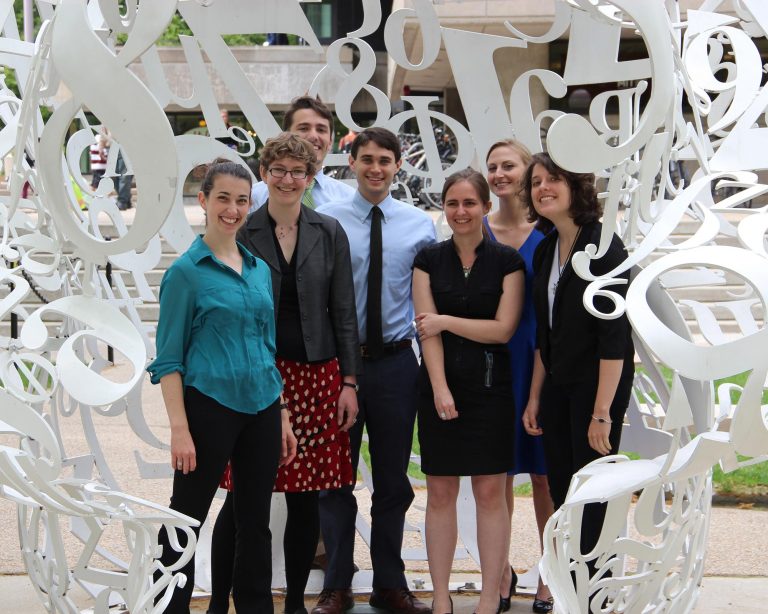Crafting a Community of Writers
-
-
slice.mit.edu
- 1
Filed Under
Recommended

There’s a small but powerful graduate program that’s quintessentially MIT in rabid pursuit of scientific knowledge and discovery, but set apart by its focus on telling the story of that discovery. Alumni publish in Buzzfeed and Esquire, in Science Magazine and Popular Science, on subjects ranging from dinosaurs to global warming; they include a Pulitzer Prize winner, a Carson Book Prize winner, and a Fulbright-National Geographic Digital Storyteller. The MIT Graduate Program in Science Writing (GPSW) prepares students for a lifelong career in science writing.The program is small—this year’s class has eight students—and it’s compact, clocking in at a year long. But it packs a lot into that year. Each student completes an internship, thesis, and video documentary, all while coming up with potential story ideas, writing articles, and taking classes with faculty who are New York Times bestselling authors and renowned journalists. Students will be published in GPSW’s own publication, Scope, and some faculty members also accept article pitches for their publications.Tim De Chant, who teaches GPSW’s news writing section and is founding editor of Nova Next, emphasizes that the scope gives students basic tools for writing success. “Every news story the students write is not just an assignment—it’s also a pitch. That experience is critical.” When they graduate, students will pitch editors story ideas regularly, and it’s helpful to know what will set their ideas apart.Some students come with a specialty in hand, like astronomy or robotics, in which case they’re encouraged to use their electives to branch out and enlarge their exposure. Other students seek to transition into science writing, in which case their study will fill holes in their background. In all cases, the writing is grounded in research: each student spends 12 hours in one of MIT’s labs and publishes a profile about it in Technology Review.Former program member Josh Sokol SM ’15 is branching out from writing about astronomy into more diverse, long-form storytelling. He points out that GPSW also facilitates advanced science writing like non-linear multimedia methods of storytelling. “The program is full of aspirational work—which you often can’t do in your first few years as a science writer,” he says. “It’s like a tasting plate for what being a science writer will be like.”Many graduates go on to a freelance writing career, which can be a lonely, challenging experience with no guaranteed income, rejection from editors, and stiff competition. The program staff champion former students and connect them to resources and potential work.GPSW keeps alumni connected through their mailing list, formal and informal social events, a mentoring program with current students, and invitations to attend the GPSW graduations. GPSW also promotes published work by alumni on Facebook and Twitter. The small size of the program helps make room to spotlight everyone: since the first class graduated in 2003, there are just over 100 alumni.Shannon Larkin, GPSW administrator, recently started a private Slack channel so alumni could communicate in real time. “Within minutes, they had set up their own meeting rooms and started connecting with each other and complaining about deadlines,” she says.Sokol loves that community connection. “I’m often interviewing sources and talking to editors. Sometimes I’m desperate to have peer contact and share information.”Christina Couch SM ’15, a freelancer who used the program to transition to technology and robotics writing, says the community has helped her with mentoring, getting work, and even helping find people to interview.The GPSW faculty and staff are the linchpin for connectivity. “Shannon is happy to put you in touch with other alumni and help you problem-solve when you have a writing challenge. She knows everyone, and she cares very deeply,” says Couch.De Chant teaches students to think from the reader’s perspective so, no matter their focus, they can learn how to communicate the excitement of science and new research. “You have to be able to tell your story in one line, there has to be an easy way to describe it, the imagery has to be good, and you have to think in terms of active, forward statements.”“We’re teaching students how to be reporters, for news stories, today.”








Comments
David A. Mark
Wed, 09/27/2017 3:58pm
My undergrad (class of '73) creative writing class convinced me that although I was an avid reader, I could not write well. Whatever writing-for-the-public skills I had stayed dormant until I career-changed to a self-employed consultant. Writing science articles for trade magazines was essential to creating a presence as an expert in my field. Getting paid (up to $800 per article) was a bonus. Thirteen years later I can truthfully say that being able to explain science to non-scientists has been an essential foundation to my business.